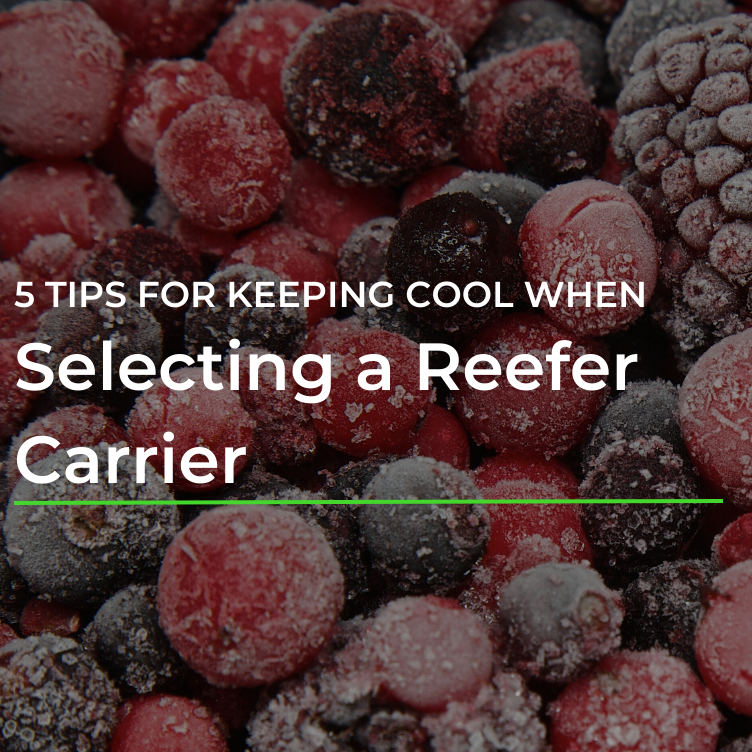Refrigerated trucks, also known as reefer or reefer carrier, are an essential cold chain solution for transporting temperature-sensitive cargo. But what are reefer trucks, and why do they pose challenges for brokers?
The term "reefer carrier" refers to a truck, trailer, or shipping container with a refrigeration unit for transporting sensitive goods. From ice-covered railroad cars in the 1840s to the modern fleets of today, refrigerated trucking is one of the most crucial components of the supply chain. Over 90% of the food that Americans consume is hauled by refrigerated trucks. However, reefers carry more than just food—they also transport medicine, electronics, flowers, perfume, cosmetics, and fine art.
Challenges of Finding Reefer Carriers
Since refrigerated trucks play such a vital role in U.S. commerce, it might seem easy to find a carrier, but it's not that simple. The time-sensitive, temperature-controlled world of refrigerated shipping comes with its own rules. Unlike general cargo, reefer carriers are highly fragmented, lacking a singular network of carriers. Shippers must often work with multiple carriers across different regions to meet their delivery requirements. Additionally, delivering refrigerated goods is challenging: windows are shorter, appointment times are stricter, penalties are steeper, and there is always a risk of spoilage.
Factors to Consider When Choosing Reefer Carriers
To save money and reduce risk, shippers should understand key factors involved in refrigerated transportation. These factors include geography, temperature requirements, loading techniques, technology, and communication.
Geography
Before booking anything, you need to know where the shipment is headed and what is being transported. This is crucial for any cargo but especially true for reefer shipments. Reefer carriers are fragmented, and seasonal and ambient temperatures must also be considered. Cargo destined for Reno in August will have different temperature considerations compared to a similar trailer headed to Buffalo in February.
Temperature
Refrigerated trailers maintain temperatures between 55°F and -20°F, but how well they do this varies. Once you've determined the required temperature range for your product, ensure that your reefer carrier can maintain their trailer within that range. Not all carriers can handle a wide spectrum of temperatures.
Loading Techniques
Loading a reefer container requires considering the commodity type and packaging. Temperature is crucial, so proper airflow must be maintained throughout the trailer. As a general rule, frozen cargo needs airflow around the product, while chilled commodities (like fruits and vegetables) require air to flow through the cargo. Loading techniques, such as block and palletized stowage, affect how much cargo can fit in the trailer, which impacts FTL (full truckload) and LTL (less-than-truckload) shipments.
Technology
Now that you know your temperature needs, you must work with a carrier that can both transport cargo at that temperature and monitor it along the way. Knowing the trailer is at 25°F when it leaves the lot is one thing; ensuring it stays at that temperature throughout the trip is another. Many carriers offer remote monitoring, which is invaluable for more sensitive goods. Whether monitored remotely or not, it's crucial to discuss with your carrier where monitoring devices will be placed. Incorrect placement can lead to inaccurate readings. Also, consider other temperature assists, like dry ice, if needed.
Communication
Your reefer carrier must not only deliver goods on time and at the correct temperature but also make the agreed-upon delivery appointment. Although the shipper and buyer may agree on a specific delivery window, the carrier may attempt to confirm delivery outside of these times, leading to penalties or lost cargo. This detail separates good carriers from great ones. Clear handling guidelines, including "out of temperature" agreements, are also essential to avoid confusion and determine liability for carrier negligence.
Conclusion
Selecting the right reefer carrier requires careful planning and knowledge of various factors. Going it alone can be challenging. Reach out to FreightPlus today to learn how we can help you find and build strong relationships with reliable carriers in this market.



